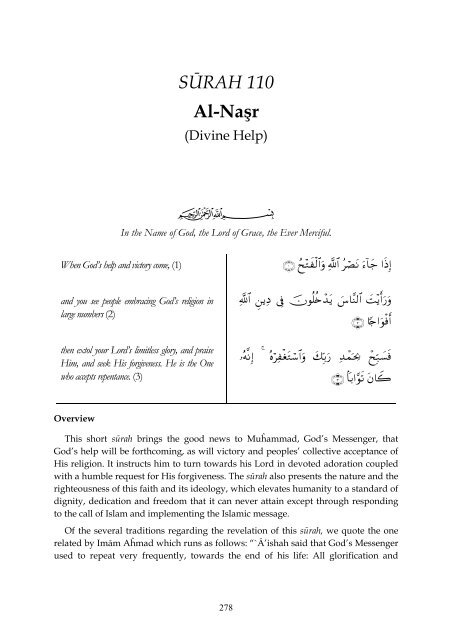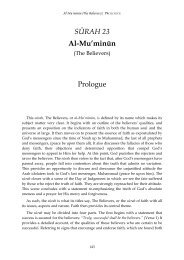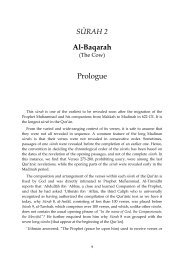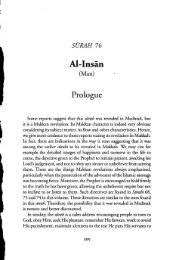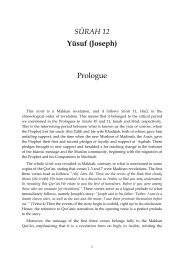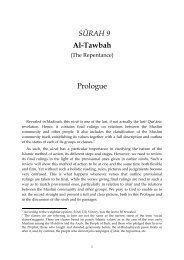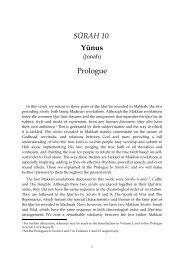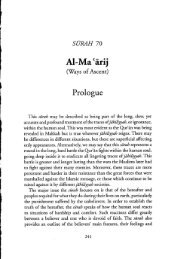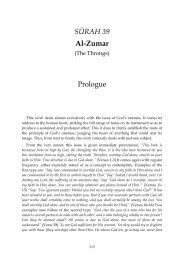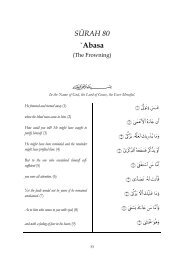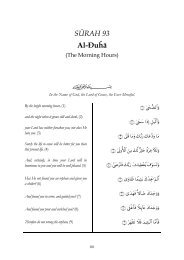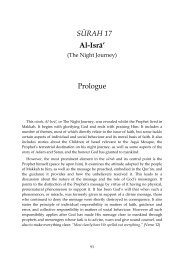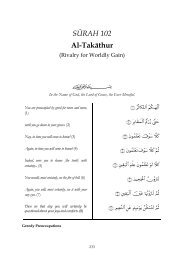110) An-Nasr - TAFSIR FI ZILAL AL-QURAN
110) An-Nasr - TAFSIR FI ZILAL AL-QURAN
110) An-Nasr - TAFSIR FI ZILAL AL-QURAN
You also want an ePaper? Increase the reach of your titles
YUMPU automatically turns print PDFs into web optimized ePapers that Google loves.
4SŪRAH <strong>110</strong>Al-Naşr(Divine Help)ijkIn the Name of God, the Lord of Grace, the Ever Merciful.When God’s help and victory come, (1)∩⊇∪ ßx÷Gxø9$#uρ «!$# ãóÁtΡ u!$y_ #sŒÎ)and you see people embracing God’s religion inlarge numbers (2)«!$#Ç⎯ƒÏŠ’Îûšχθè=ä{ô‰tƒ}¨$¨Ψ9$#|M÷ƒr&u‘uρ∩⊄∪ %[`#uθøùr&then extol your Lord’s limitless glory, and praiseHim, and seek His forgiveness. He is the Onewho accepts repentance. (3)…çμ¯ΡÎ)çνöÏøótGó$#uρy7În/u‘ ωôϑpt¿2 ôxÎm7|¡sù∩⊂∪ $R/#§θs? tβ%Ÿ2OverviewThis short sūrah brings the good news to Muĥammad, God’s Messenger, thatGod’s help will be forthcoming, as will victory and peoples’ collective acceptance ofHis religion. It instructs him to turn towards his Lord in devoted adoration coupledwith a humble request for His forgiveness. The sūrah also presents the nature and therighteousness of this faith and its ideology, which elevates humanity to a standard ofdignity, dedication and freedom that it can never attain except through respondingto the call of Islam and implementing the Islamic message.Of the several traditions regarding the revelation of this sūrah, we quote the onerelated by Imām Aĥmad which runs as follows: “`Ā’ishah said that God’s Messengerused to repeat very frequently, towards the end of his life: All glorification and278
Al-Naşr (Divine Help)praises are due to God. I seek His forgiveness; and I repent of my sins.’ He also said:‘My Lord told me I would see a sign in my community. He ordered me to glorify andpraise Him, the Forgiving, and ask His pardon when I see this sign. Indeed, I have.When God’s help and victory come, and you see people embracing God’s religion in largenumbers then extol your Lord’s limitless glory, and praise Him, and seek His forgiveness. Heis the One who accepts repentance.’“ [Related also by Muslim with a different chain oftransmission.]Ibn Kathīr says in his commentary on the Qur’ān: “The victory mentioned in thissūrah refers, as unanimously agreed, to the conquest of Makkah. The Arab tribeswere awaiting the settlement of the conflict between the Quraysh and the Muslims,before making a decision about their acceptance of Islam, saying that if Muĥammadwere to prevail over his people, he would indeed be a prophet. Consequently, whenthat was accomplished they accepted Islam in large numbers. Within two years of theconquest of Makkah, the whole Arabian Peninsula was dominated by Islam, and, allthanks to God, every Arab tribe declared its belief in Islam.”In his Şaĥīĥ al-Bukhārī quotes `Amr ibn Salamah as saying: “When Makkah fell toIslam, every tribe hastened to declare to God’s Messenger its acceptance of Islam.They were waiting for it to take place, saying, ‘Leave him alone with his people. Hewould indeed be a prophet if he prevailed over them...”These reports are chronologically in line with the wording of the sūrah, in thesense that its revelation was a sign of something to follow, with some instructions tothe Prophet on what he should do when this event would take place.There is, nevertheless, a different report which is not difficult to reconcile with theone we have already discussed. `Abdullāh ibn`Abbās, the Prophet’s cousin andlearned Companion, reports: “Umar used to let me join the company of elders whowere present at Badr, but some of them felt uneasy and asked why I should beallowed with them when I was of the same age as their own children. But `Umar saidto them, ‘You know to what family he belongs.’ One day `Umar invited them all andinvited me as well. I felt that he wanted to show them why he gave me such aprivilege. He asked them, ‘What do you make of God’s saying: When God’s help andvictory come?’ Some of them replied, ‘It is an order that we must praise Him and seekHis forgiveness when He helps us to triumph and bestows His favours on us.’ Othersremained silent. Then `Umar asked me, ‘Do you agree with this view, Ibn `Abbās?’ Ianswered in the negative. `Umar asked me again, ‘What, then, do you say?’ I replied,‘It was a sign from God to His Messenger indicating the approach of the end of hislife. It means: when God’s help and victory come, you should know that your end isnear, then extol your Lord’s limitless glory, and praise Him, and seek His forgiveness. He isthe One who accepts repentance.’“ `Umar commented, ‘To my knowledge, it only meanswhat you have just said.” [Related by al-Bukhārī.]279
Al-Naşr (Divine Help)So it is possible that God’s Messenger, having witnessed his Lord’s sign, realizedthat he had fulfilled his mission in this life, and that it was time for him to depart,which was what Ibn `Abbās actually meant.A different report related by al-Bayhaqī, also on Ibn `Abbās’s authority, mentionsthat when this sūrah was first revealed, the Prophet asked his daughter, Fāţimah, tocome over and told her, ‘My death has been announced to me.’ She was seen to startcrying. But a little later she smiled. Some time later she explained, “I cried when hetold me of his approaching death. But he then said to me, Be patient, because youwill be the first of my household to join me’, so I smiled.”According to this last ĥadīth, the time of the revelation of the sūrah is actually fixedas coming later than the sign. That is, the victory and the people’s collectiveacceptance of Islam. When events took place in this fashion the Prophet knew thathis life would soon come to a close. But again the first account is more authentic andfits in more suitably with the import of the sūrah, especially as the incidentconcerning Fāţimah and her crying and smiling is related in a different context whichagrees with the version we prefer. This other report goes as follows: “Umm Salamah,the Prophet’s wife, said: ‘The Prophet invited Fāţimah one day during the year of thevictory and spoke to her in private. She cried. Then he spoke to her again and shewas smiling. After he died, I asked her about the incident and she explained, God’sMessenger told me he was soon to die, so I cried. Then he told me that I would be thenext most celebrated woman in heaven, next to Maryam bint `Imrān, so I smiled.’“[Related by al-Tirmidhī.]This report agrees with the general meaning of the Qur’ānic text and with whatImām Aĥmad related, which also appears in Muslim’s Şaĥīĥ. That is, there was a signbetween God and His Messenger, which the sūrah specifies. Hence, when the victorythat secured Makkah to Islam was accomplished, the Prophet knew that he was soonto meet his Lord. Hence he spoke to Fāţimah in the manner described by UmmSalamah.<strong>An</strong> Awaited EventWe will now consider the permanent import and instructions outlined in this shortsūrah: “When God’s help and victory come, and you see people embracing God’s religion inlarge numbers, then extol your Lord’s limitless glory, and praise Him, and seek Hisforgiveness. He is the One who accepts repentance.” (Verses 1-3)The beginning of the first verse implicitly presents a concept of what goes on inthis universe and the events that take place in this life. It also covers the actual role ofthe Prophet and his followers in the progress of Islam, and to what extent it dependson their efforts. ‘When God’s help and victory...’, denotes that it is help granted by God,280
Al-Naşr (Divine Help)and it is He who brings about victory in His own good time, in the form He decidesand for the purpose He determines. The Prophet and his Companions have nothingto do with it at all, and they obtain no personal gain from it. It suffices for them thatHe does it through them, appoints them as its guards and entrusts it to them. This isall they acquire from God’s help, the victory and people’s acceptance en masse of Hisreligion.According to this concept, the duty of the Prophet and his Companions whomGod chose and gave the privilege of being the instruments of victory for His cause,was to turn to Him at the climax of victory in praise, expressing gratitude andseeking forgiveness. Gratitude and praise are for His being so generous as to havechosen them to be the standard-bearers of His religion; for the mercy and favour Hedid to all humanity by making His religion victorious; and for the conquest ofMakkah and people’s collective acceptance of Islam.His forgiveness is sought for any defective feeling, privately entertained, such asvanity, which sometimes creep into one’s heart when victory is attained after a longstruggle. It is almost impossible for human beings to prevent this happening andtherefore God’s forgiveness is to be sought. Forgiveness also has to be sought forwhat might have been insinuated within one’s heart during the long and cruelstruggle and for petulance resulting from a conceived delay of victory, or the effectsof convulsive despair, as the Qur’ān mentions elsewhere: “Do you reckon that you willenter paradise while you have not suffered like those [believers] who passed away before you?Affliction and adversity befell them, and so terribly shaken were they that the Messenger andthe believers with him would exclaim, ‘When will God’s help come?’ Surely, God’s help isclose at hand.” (2: 214)It is also necessary to seek God’s forgiveness for one’s shortcomings in praisingGod and thanking Him for His infinite favours which are granted at all times. “If youwere to count God’s favours, never will you be able to number them.” (16: 18) Howevergreat one’s efforts in this respect are, they are never adequate.Seeking forgiveness at a moment of triumph also arouses feelings of weakness andimperfection at a time when an attitude of pride and conceit seems natural. All thesefactors guarantee that no tyranny will afflict the vanquished. The victorious leader ismade to realize that it is God who has appointed him, a man who has no power ofhis own and who is devoid of any strength, for a predetermined purpose;consequently the triumph and the conquest as well as the religion are all His, and toHim all things ultimately return.This is the lofty, dignified ideal the Qur’ān exhorts people to toil towards, an idealin which man’s exaltation is in neglecting his own pride and where his soul’sfreedom is in his subservience to God. The goal set is the total release of human souls281
Al-Naşr (Divine Help)from their egoistic shackles, their only ambition being to attain God’s pleasure.Along with this release there must be exerted effort which helps man flourish in theworld, promotes human civilization and provides a rightly-guided, unblemished,constructive, just leadership devoted to God.By contrast, man’s efforts to liberate himself while in the grip of egoism, shackledby his zest for worldly things, or overpowered by his cravings, turn out to beabsolutely useless unless he frees himself from personal desires and ambitions. Hisloyalty to God must be made to override everything else, particularly at the momentof triumph and the collection of booty. Such behaviour, which God wants humanityto attain, was the characteristic feature of all the Prophets.Such was the case with the Prophet Joseph, when all he wanted was achieved andhis dream came true: “<strong>An</strong>d he raised his parents to the highest place of honour, and they felldown on their knees, prostrating themselves before him. He said: ‘Father, this is the realmeaning of my dream of long ago. My Lord has made it come true. He has been gracious tome, releasing me from prison, and bringing you all from the desert after Satan had sowndiscord between me and my brothers. My Lord is gracious in whatever way He wishes. He isAll-Knowing, truly Wise.” (12: 100)Then, at that moment of climax, Joseph took himself away from the jubilations andembracing arms to turn towards his Lord, praising Him with a pure sense ofgratitude: “My Lord, You have given me power and imparted to me some understanding ofthe real meaning of statements. Originator of the heavens and the earth! You are my guardianin this world and in the life to come. Let me die as one who has surrendered himself to You,and admit me among the righteous.” (12: 101)Thus any sense of his own egotism and happiness brought about by his reunionwith his family vanished, and the picture we are left with is that of an individual,Joseph, praying to God to help him remain submissive to Him until he dies and to lethim, out of His mercy and grace, join His righteous servants.o, it was also with the Prophet Solomon, when he saw the Queen of Sheba’s thronebrought into his very reach: “When he saw it set in his presence he said: ‘This is of thebounty of my Lord, that He may try me whether I give thanks or remain ungrateful. He whogives thanks does so for his own good, and he who is ungrateful, well, my Lord is all sufficientand bountiful.” (27: 40)<strong>An</strong>d so indeed it was with Muĥammad throughout his life. In the moment oftriumph, as the conquest of Makkah was accomplished, he entered the city on theback of his camel with his head bowed low. He forgot the joy of victory andthankfully bowed his head seeking his Lord’s forgiveness, even though he had justconquered Makkah, whose people had openly and unashamedly persecuted andexpelled him. This also was the practice of his Companions after him.282
Al-Naşr (Divine Help)Thus, upon belief in God, was that great generation of humanity raised very high,reaching an unparalleled standard of greatness, power and freedom.283


